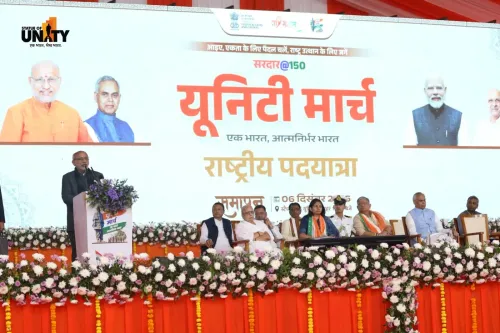Did Pakistan PM Acknowledge Indian Strikes on Nur Khan Air Base?

Synopsis
Key Takeaways
- Operation Sindoor demonstrates India's military precision.
- Pakistan PM Shehbaz Sharif confirmed airstrikes on Nur Khan Air Base.
- The operation targeted critical military assets.
- India launched 24 missiles in just 25 minutes.
- The situation may lead to Pakistan relocating military headquarters.
New Delhi, May 17 (NationPress) India's Operation Sindoor has sent shockwaves through the military corridors of Pakistan, illustrating the unmatched accuracy and strategic prowess of the Indian armed forces.
The scale of the operation caught the Pakistani leadership off guard, with Prime Minister Shehbaz Sharif himself admitting that the Nur Khan Air Base was targeted.
At 2:30 a.m. on the night between May 9 and May 10, General Asim Munir abruptly woke Prime Minister Sharif to inform him of extensive strikes deep into Pakistani territory.
Amit Malviya, who leads the BJP's National IT Department and is Co-incharge of West Bengal, underscored the seriousness of the situation, noting that Sharif acknowledged the bombing of the Nur Khan Air Base among other sites.
He characterized the incident as a demonstration of the boldness and efficacy of Operation Sindoor.
"Pakistan PM Shehbaz Sharif has confirmed that General Asim Munir called him at 2:30 a.m. to inform him that India had bombed Nur Khan Air Base and various other locations. This is significant -- the Prime Minister was roused from sleep to learn of strikes deep within Pakistan. It highlights the scale, precision, and daring of 'Operation Sindoor,'" Malviya expressed on his official X account.
Launched in retaliation for a Pakistan-backed terrorist attack in Pahalgam, the operation involved decisive airstrikes on critical Pakistani military facilities, including the Nur Khan Air Base in Rawalpindi.
The implications of this strike are substantial, as the base, formerly known as PAF Chaklala, is crucial for Pakistan's Air Mobility Command, housing essential assets like Saab Erieye (airborne early warning systems), C-130 transport aircraft, and IL-78 aerial refueling tankers.
The destruction of this facility represents a significant strategic setback, drastically hampering Pakistan's ability to carry out rapid military operations.
Reports indicate that the Indian Air Force executed precision strikes on at least eight Pakistani air bases, targeting runways, radar installations, aircraft hangars, and command centers.
Satellite images have unveiled extensive damage, with craters appearing on vital airstrips and military transport vehicles left in ruins.
The operation was executed with remarkable efficiency, with India launching 24 missiles in just 25 minutes, leaving Pakistan struggling to grasp the full extent of the devastation.
The boldness of India's military strategy and its capacity to penetrate Pakistan's defenses with surgical precision have been clearly demonstrated.
In the aftermath of the attack, Pakistan is reportedly contemplating relocating its military headquarters from Rawalpindi to Islamabad, fearing further strikes.
The international community has taken note of India's military capabilities, with analysts commending the precision and success of Operation Sindoor.










